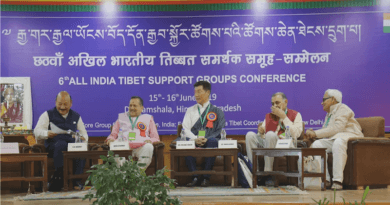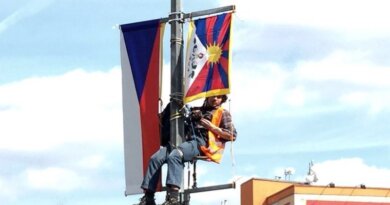TCHRD Releases Tibetan Guidebook on UN Special Procedures on UN Day: Urges all Organisations, Individual Tibetans to Engage and Involve
By Tsering Choephel

DHARAMSALA, 24 Oct: The Tibetan Centre for Human Rights and Democracy (TCHRD), in commemoration of the 78th United Nations (UN) Day today, released a Tibetan guidebook, ‘Engaging with the Special Procedures’ a booklet introducing one of the most significant human rights mechanisms: the Special Procedures, highlighting its significance, workings and relevance to Tibet’s struggle.
Nyiwoe, the TCHRD researcher, noted that “most avenues encompassing human rights issues under the UN aren’t accessible to us due to several reasons: our statelessness, not being a member of the UN, the power influence of China, and the lack of powerful organisations.”
However, “the UN Special Procedure remains open and accessible to all individuals and organisations alike.” Therefore, TCHRD, in publishing this important booklet, hopes that the Central Tibetan Administration, non-governmental organisations, and individual Tibetans would make use of the guidebook to explore the Special Procedure avenue to address Tibetans’ plight on the biggest international stage like the UN.
Acknowledging the power and influence of China within and beyond the UN, where China continues to deny or divert discussions – the fact that “Tibetan matters have been on the UN discussion table multiple times is a success,” Nyiwoe declared. He warns that the dwindling discussion of Tibet on the international stage could give the wrong impression that no persecutions, like those taking place in East Turkestan, are happening inside Tibet, which is not the case.
Tabling discussions about persecution and injustice inside Tibet, East Turkestan, and even China on international platforms like the UN equals “slapping” at China and its millions of dollars expenditure on painting a positive, saintly image of itself globally.
TCHRD legal associate Phurbu Dolma said, “In the last one and a half years, we have submitted 21 urgent appeals to the UN through UN Special Procedures,” noting that three submissions in October this year include Tsultrim, who was arrested in February for the possession of Dalai Lama’s photo, Tsepo, and Wangchen, a former political prisoner who is currently being treated in a hospital for injuries sustained from beatings under Chinese authority.
She also noted that Geshe Rachung Gendhun and Geshe Sonam Gyatso are part of the 21 urgent appeals submitted to the UN. Geshe Sonam Gyatso, in the process of TCHRD’s correspondence with the UN, was released from prison on 23 May, though in poor health conditions. And TCHRD continues its appeal for Geshe Rachung Gendhun’s release.
On 10 August this year, a joint statement from three UN experts condemned China’s lack of transparency in the arrest, trial, and imprisonment of nine Tibetan environmental activists and called on China to refrain “from persecuting environmental human rights defenders and release all nine immediately.”
In February, UN experts expressed grave concerns over China’s policies aimed at assimilating Tibetan people culturally, religiously, and linguistically through a residential school system that has affected around a million Tibetan children.
The UN Special Procedure is like the “ears and eyes” of the UN Human Rights Council. It constitutes a vital cadre of independent human rights experts and working groups. As such, the mechanisms address a broad spectrum of thematic human rights issues, encompassing civil, cultural, economic, political, and social rights.






